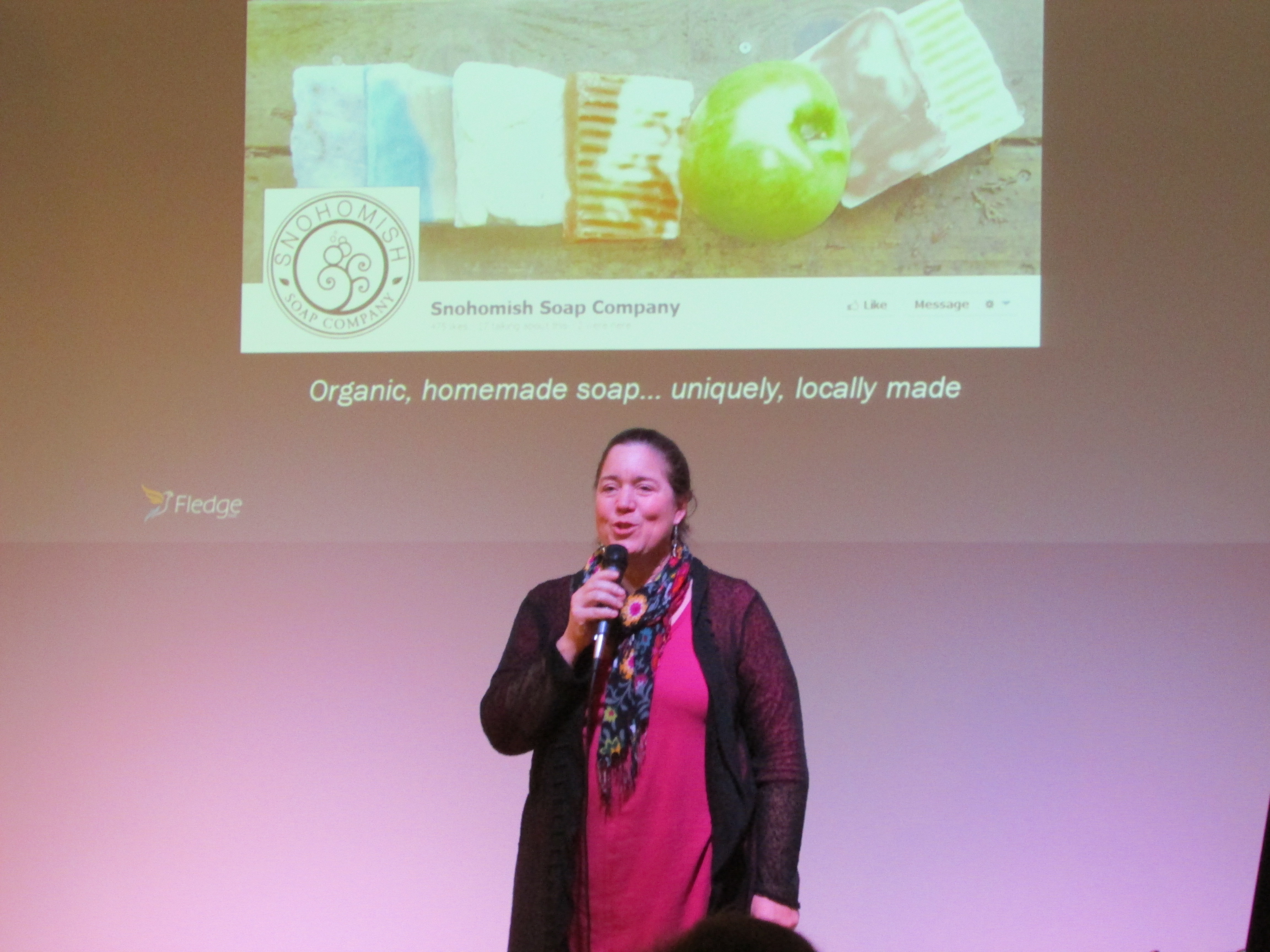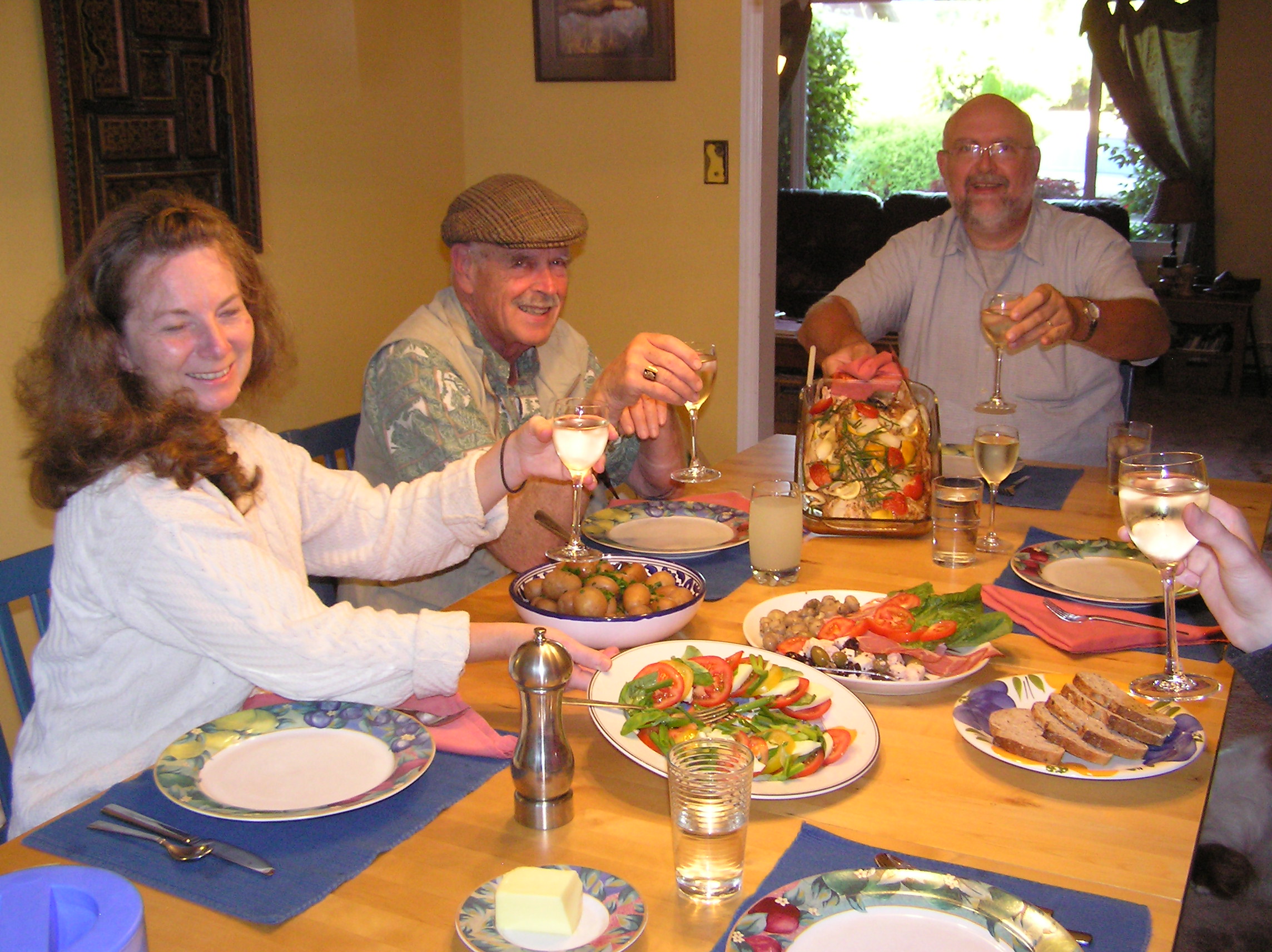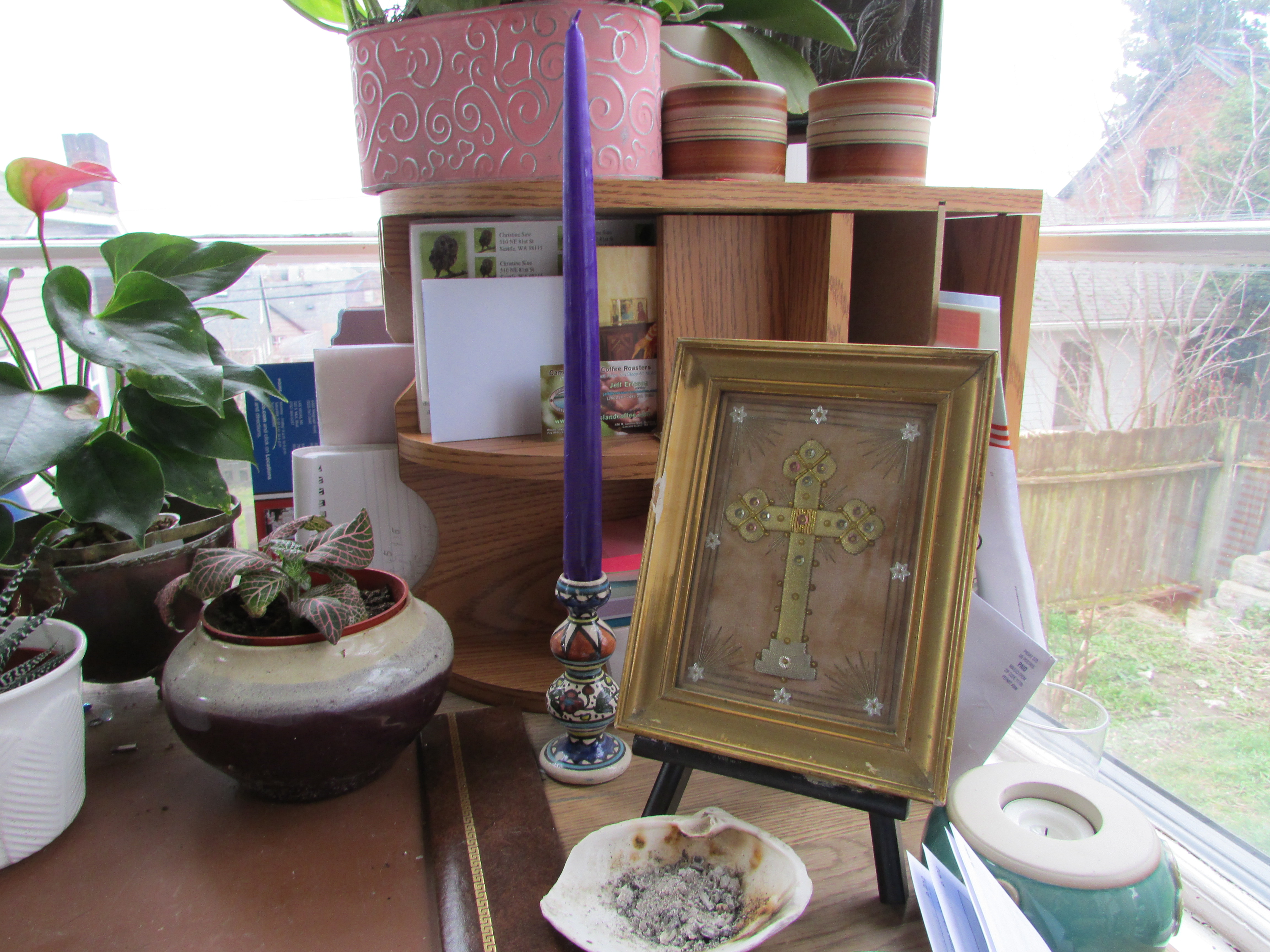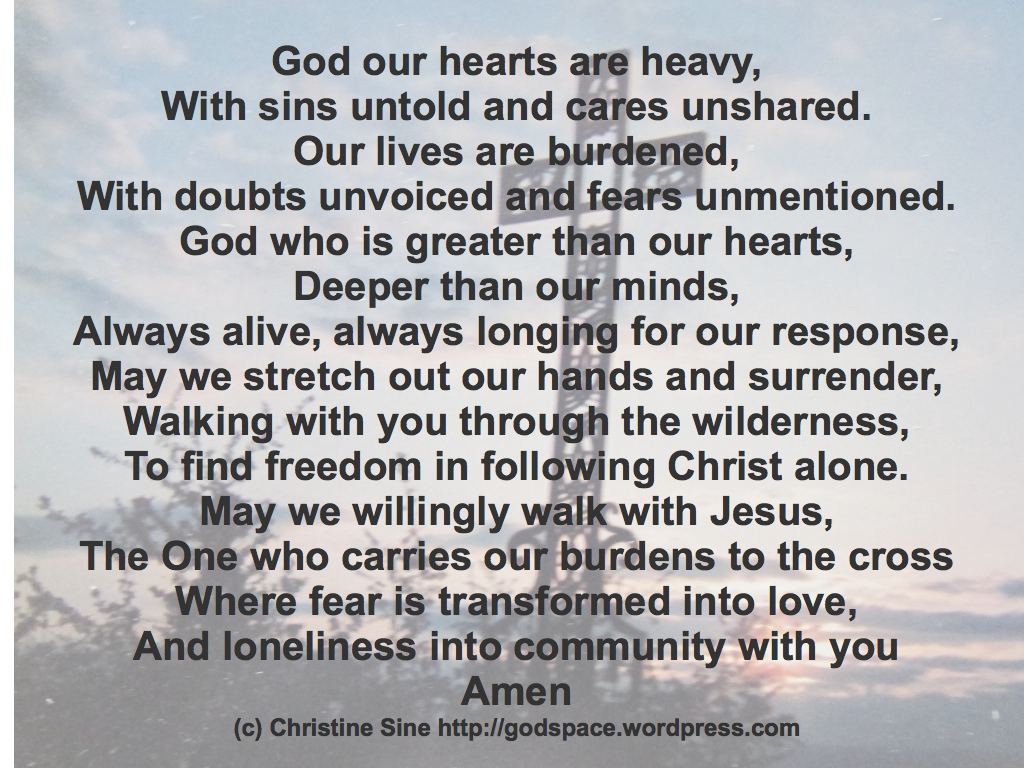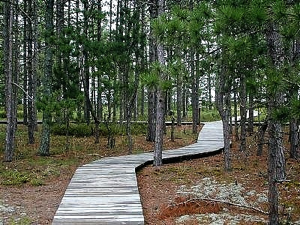Today’s post in the Lenten series Return to Our Senses is written by Kimberlee Conway Ireton who has embarked on a Year of Prayer. To help hold her accountable to this commitment to live more prayerfully, she promised herself (and her blog readers) that she’d write about (some of) her prayer experiences.
Until three years ago, the glass of my life was always half empty with a hole at the bottom where everything leaked out. Then, during Advent that year, I began to make a gift list. Not a list of gifts I wanted, a list of gifts I already had—and for which I was grateful. At the time, this list was a way to cope with a whole lot of professional disappointment and an unexpected pregnancy.
The list turned out to be a whole lot more than I bargained for. It has taken my glass-half-empty view of the world and upended it: my glass has never been half empty; it’s always been filled to overflowing. There wasn’t a hole in the bottom at all: it was spilling over the sides.
But until I started counting the gifts, I simply couldn’t see that. I fixated on my problems and never noticed all the ways God was meeting me in the midst of them. I fixated on what I wanted that I didn’t have and missed the many gifts I did have, gifts I took so for granted that I didn’t even notice them.
I now see the error of my former ways. The problem with someone like me entering into a practice like this is that it can make me smug and judgmental: people who are still stuck in the cultural mindset of more, more, more sometimes strike me as pathetic and annoying.
They whine too much. They complain too much. They don’t see how good their lives are. They don’t see that the way they work/spend their time/spend their money/parent their children/view the world is making their lives harder than they need to be. If only they could be more like, well, me.
Luckily, God is hell-bent on destroying my smugness, and into the midst of my judgment and gracelessness he sends these words from William Willimon:
The first word of the church, a people born out of so odd a nativity, is that we are receivers before we are givers. Discipleship teaches us the art of seeing our lives as gifts. That’s tough, because I would rather see myself as a giver. I want power—to stand on my own, take charge, set things to rights, perhaps to help those who have nothing. I don’t like picturing myself as dependent, needy, empty-handed.
The words are a smack in the face of my smugness: “we are receivers.” All that I have learned and become—any spiritual health and whatever wisdom is in me—it’s all a gift. It’s all grace from the hand of God. The only thing that separates me from anyone else is that somehow, by God’s grace, God got my attention, shook me by the scruff of the neck, hauled my eyelids up, and said, “See!” And—again, God’s grace—I saw.
I can take little credit for this—it is God’s work, God’s grace working in me. My only role is Mary’s: “Be it done to me according to your word.” That is all. Perhaps I could even manage to feel smug about saying yes—but how many times have I said no? How many times have I refused to see God’s grace, refused to receive God’s grace, refused to give thanks for God’s grace, God’s gifts?
Oh, Jesus, thank you for this reminder that it is all grace, that even my yeses are gifts from you, the grace to receive your grace! Forgive my arrogance. Forgive my gracelessness. Help me to see and believe and live the truth that even my desire to say yes to you comes from you, much less the ability to open my lips and proclaim your praise. Help me to inhabit this place of grace, of gift, of receptivity, of open-handedness, of submission. Help me to live and write and think and speak and parent from this place of grace.
Last night Tom and I attended the welcome for the new cohort of Fledge: A conscious company incubator. Up there on the stage was MSA’s own Cindy Todd. We are so proud of Cindy and all she is doing.
“You are my hero” Tom told Cindy at our last MSA team training day. The launch of the Snohomish Soap Company, inspires us with a unique business model that is exciting the attention of many who like us think Cindy’s entrepreneurial approach is brilliant. She has been featured in TED talks(fast forward to 1hour-4min. for Cindy’s part) and PCC’s promotional flyer, and now the Fledge conscious company incubator. Her dedication to helping those at the margins by empowering them to develop small businesses, incentivizes all of us to apply our God given creativity to new entrepreneurial models that will sustain us in our volatile world.
The next event on the MSA calendar is Cindy Todd’s workshop, Igniting the Divine Spark. We are all looking forward to hearing more about what has ignited her divine spark and inspired the creativity that lay dormant for many years of her life.
Today’s post in the Lenten series Return to Our Senses is an excerpt from April Yamasaki‘s new book Sacred Pauses: Spiritual Practices for Personal Renewal. The questions at the end of this excerpt are excellent ones for all of us to ask ourselves as we journey through Lent.
April is lead pastor of Emmanuel Mennonite Church in Abbotsford, B.C and is third-generation Canadian of Chinese descent. She has published numerous articles and several books which you can check out on her website. I have thoroughly enjoyed this book and heartily recommend it to you.
“Come Lord Jesus, be our guest, and let this food to us be blest.” I learned this table grace as a child and repeated it so often that even now as an adult I sometimes pray these same words when I offer a silent prayer before a meal. The words have a comforting rhythm and come quite naturally to me – so automatically, in fact, that I’m tempted to rattle them off without thinking. But when I slow down and focus when I’m truly present and paying attention, these simple words can carry me more deeply into prayer.
I reflect on Jesus as a guest at my table, how his presence transforms an ordinary meal into an opportunity for communion with God. I am reminded of “our” table. Even when I’m eating alone, I remain part of a community and a world where some take too much and others do not have enough of God’s abundance. The words of blessing remind me never to take food for granted, but to receive even leftovers with thanks as a blessing from God. In this way my childhood prayer has become as heartfelt an personal as any spontaneous come-as-you-are prayer might be and continues to teach me how to pray.
I still have a lot to learn about the breadth and depth of prayer. How do I pray at six o’clock in the morning when someone calls in crisis? What do I pray for the person who is struggling, who is in such deep pain yet keeps making the kinds of choices that make everything worse? How do I keep praying for the dame person, the same situation over and over without getting tired and giving up, without getting bored? How do I pray continually as described in Scripture? What does it mean for prayer to become personal renewal instead of drudgery, to become a joy instead of a burden?
Every year my good friend Mark Pierson in New Zealand sends me a copy of his Lenten reflections which I love to use throughout this season. It has just arrived and I am thoroughly enjoying his thoughts. So instead of adding another post today for the series Return to Our Senses, I thought I would just direct you to these for your meditation.
Mark reminds us that the liturgical colour for most of the days of Lent is violet (though purple or dark blue will work), the colour of royalty and kingship. He suggests placing a small piece of violet/purple/dark blue cloth or paper in a place on a table or ledge to make a focus for you during your Lenten journey. From time to time you can add things to this place to remind you of your progress in this Lenten journey.
This morning I could not find a purple piece of paper but added a purple candle to my corner and will use it through the rest of this season as a focus for my morning reflections. It will stand amidst the clutter on my desk, beside my bowl of ashes and the cross I have been using as a focal point.
What are you using to help you focus during this journey of Lent?
Today’s reflection in the series Return to Our Senses in Lent comes from Jim Fisher. Jim tells me he has no credentials. He has no degree. He is the author of no books. He has never attended a seminary. But he does love his journey of faith and loves to write stories he calls Holy Hugs. It’s not really a blog, but rather a collection of stories and reflections that he hopes nourish and inspire the right side of your brain in this crazy left-brained world.
——————————-
Phew! What a journey this is! I need to take a detour off this trail, plop myself on the beach up ahead beyond the edge of the trees. I need to take off my shoes and dig my toes and my sit-bones into the warm sand. Dear Lord, rest my soul, rest my body. I need a break.
I close my eyes and allow the sun to warm my face and the upturned palms of my hands. My index fingers lightly touch my thumbs. The sound of the breaking waves off in the distance fills me with a mysterious and profound peace. I am alone … but not really.
It is Ash Wednesday, the beginning of Lent. I have to give something up. I do this every year. What should it be? TV? Nope. Already did that … fifteen years ago … never to return. Chocolate? Desserts? Nope. No sugar for me, thanks. I’m hypoglycemic. Beer? Wine? Maybe. Facebook? The Internet? Maybe. The Seven Deadlies: Wrath, Greed, Sloth, Pride, Lust, Envy, Gluttony? What shall it be?
Idolatry?
Maybe.
But why?
Ostensibly I go without to remind me of my lack, my separation from God; to remind me of the hole in my soul that yearns to be filled to its fullest; to remind me of the hole that yearns to be whole.
So I empty myself of something for a season to remind me of the gap that exists between who I am and who God is. I am on this walk because I feel that gap between myself and God. I am seeking Jesus to fill that gap. I am worshiping the One who can make me whole. It’s like the picture of the two cliffs with me on one side and God on the other with a chasm in between. Only Christ can fill that gap.
Right?
Idolatry is when I try to replace God with success, good looks, fortune, youth, or fame. Pick whatever you seek. Pick whatever you think you lack. Pick your gap. Pick your Idol. Place it on the other cliff and our society will supply a seemingly endless variety of products and advice promising to bridge you over to your goal. I get that. I feel those gaps.
But I also feel a gap between myself and Love, but my inability to love perfectly is different somehow. I do not approach Love as an object beautiful and sublime in itself on the opposite cliff. I do not approach Love as if it was an Idol to be worshiped. Love is not like that. Love does not say, “Look at me!”
Rather, it invites me to regard others through its lens.
In fact, Love invites me to regard all of Creation through the lens of the Holy Spirit – through the lens of Godly Love. Perfect Love is within me because the Holy Spirit is within me. But wait a minute. If God is Love, how does this fit into the metaphor? What am I really reaching for?
As I hold my face to the sun, I feel The Holy Spirit sprinting down the beach toward me. She stops. She sits facing me, gathers my hands into hers, washes her breath across my soul and whispers into my heart, “You are my beloved. Love who you are, my dear. Love who you were created to be. Open yourself to Love and allow me to seep into every corner of your Being. The One who you reach for has already has taken up residence within you. But the goal is not as you imagined. There actually is no chasm between us. We are becoming as one. I have been here since you began your walk down this path and accepted God’s Son into your life. Hold my hand. Embrace me. Give me a hug, you fool! Allow me to live through you. Arise and continue your journey, dear friend, knowing that your completeness and joy comes more out of the journey than any imagined destination.”
Oh. Wait. Now I see it. The two cliffs are merging. The two are becoming one. The metaphor is starting to dissolve and fade away. And, yes, I understand that the two will never actually become one. I will never become God. That’s not the point. The joy arises from the imperfect eternal becoming like Christ, not the perfect oneness.
As the Holy Spirit nestles herself anew into my soul, I arise, brush the sand off my pants, and continue my journey, but now it has taken on a different feel, in a way. There is a dance in my heart and a spring in my step. I am practicing speaking through Love, seeing through Love, hearing through Love, touching through Love. I am a new creation (again!).
I am starting to look through Love with wide-eyed anticipation and joy, and all of Creation starts to look a little differently through its lens.
Perfect Love does not need to be reached or accepted to work through me. It is not an end-point in itself. It is something I drink in and splash around as best I can. I hope you don’t mind.
And, too …
Love does not operate in isolation.
Love does not expect to be doted on.
Love does not even need to be understood.
What we believe about Love makes no difference. What we do through Love makes all the difference in the world.
So what stuff am I giving up for Lent? Nothing, actually, and yet everything, in a way. I am giving up and giving in – giving up on a metaphor that depicts a distant god and giving in to the God who is already within me.
Oh, Lord! I am going to need help with this! Cause your lavish, liquid Love to infuse every cell in my body and every dark corner of my soul. May it seep into every thing and every one I touch. May it filter everything I see and hear. May it harmonize with everything I speak. And may it float beneath everything I write.
… and not just for the next forty days.
Amen.

This last Saturday we gathered at the Mustard Seed House for our first Lenten retreat ever. We began with an exercise in breathing, adapting several of the prayers from Return to Our Senses, as a process that drew us into the love of our creator God. This exercise became the focus of my own reflections during the rest of the retreat and continues to shape my thoughts as I journey through Lent.
Good breathing habits do not come naturally to most adults. A baby’s torso expands like a balloon with each breath. Her belly puffs up, and her ribs swing out. It’s efficient, it’s effortless, and you can’t help but relax while watching her. But somewhere through the years we lose this ability. Stress, physical tension, chronic pain, insomnia, and even the constricting clothes we wear, transform us from powerful belly breathers into shallow chest gaspers. We need to be taught to breathe properly again.
One question that rose to the surface during the retreat is: What does the breath of God look like for you? One person mentioned the ocean, the surge of water crashing onto the beach and then being sucked back into the vast expanse created a wonderful image of the breath of God for her. Having spent twelve years of my life living on a ship on the ocean, this resonated with me too. Lying on my bed surrounded by the lapping of water on the hull is a very soothing experience. Imagining that sound as the breath makes it even more profound.
Another question we grappled with is: What constricts or diminishes the breath of God? What comes to my mind is pollution which I think is an affront to God. On Saturday, however we talked about other confining influences that prevent us breathing in the breath of God to our full capacity. Anything that restricts the freedom of the spirit in our lives diminishes the breath of God within us.
Interestingly, generally speaking, women use less of their lung capacity then men do. High heel shoes, corsets and other constricting clothing diminish our ability to take a deep breath. Spiritually too women are often more restricted then men. Their God given abilities are often confined by regulations that prevent them fully expressing or breathing out, the gifts God has placed within them.
Breathing is at the core of who we are both as physical and spiritual beings. So as you continue your journey through Lent, stop and reflect – when was the last time you took a full deep breath of the love of God and when was the last time you breathed that out in compassion and care into our world?
As an Amazon Associate, I receive a small amount for purchases made through appropriate links.
Thank you for supporting Godspace in this way.
When referencing or quoting Godspace Light, please be sure to include the Author (Christine Sine unless otherwise noted), the Title of the article or resource, the Source link where appropriate, and ©Godspacelight.com. Thank you!







